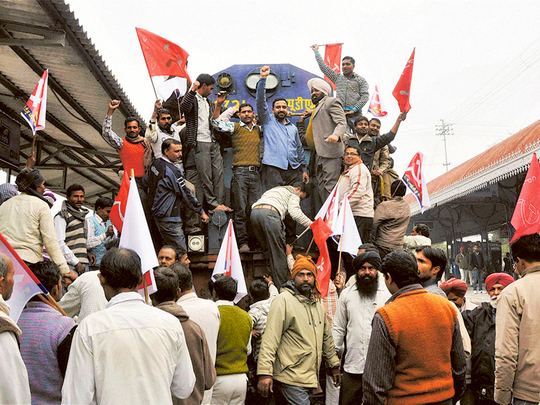
New Delhi: Even as the Indian government is in the process of delivering major reforms to re-energise the economy, the Left-affiliated central trade unions will go ahead with a nationwide strike on Friday, disregarding the government’s assurance on Wednesday to study their long-standing demands.
The Left and Congress-affiliated unions have planned the general strike to oppose the National Democratic Alliance (NDA) government’s economic and labour policies, exempting hospitals, medical stores, milk distribution and other emergency services from the daylong strike.
“There is no concrete proposal to address our demands. We have been hearing about the government’s intention to cover unorganised workers under Employee State Insurance Corporation (ESIC) for the last two years but it has failed to act. The minimum wage for unskilled worker comes out to be near Rs9,100 [Dh499] per month which is nowhere near our demand of Rs18,000 a month,” All India Trade Union Congress (AITUC) national secretary D.L. Sachdev told Gulf News.
The trade unions are apparently unhappy with the government panel’s meeting with Bharatiya Mazdoor Sangh (BMS), a major union linked to the ruling Bharatiya Janata Party’s ideological mentor Rashtriya Swayamsevak Sangh (RSS).
“It is unfortunate that during the past one year, the group of ministers appointed for discussion with unions on 12-point charter has not convened a single meeting, but has been talking only to BMS which has not joined the strike call. We condemn the move of the central government to divide the workers in the face of ongoing strike campaign and create confusion through making misleading statements,” the joint declaration issued by the 10 central trade unions stated on Wednesday.
In a press statement, BMS asked its state units to organise victory marches and publicise the recent proposals announced by the government.
Meanwhile, Trinamool Congress leader and lawyer Idris Ali on Wednesday filed a Public Interest Litigation (PIL) at the Calcutta High Court on behalf of All India Minority Forum against the strike.
“The strike will only end up harassing people and create disturbance. We have also requested the court to order the organisers to pay for any damage arising out of violence during the bandh,” Ali said.
The Left unions claimed that West Bengal Chief Minister Mamata Banerjee was “nervous” about the strike, which is causing her to issue circulars against it, and accused her and Trinamool Congress of working as agents of BJP.
“Our chief minister and Trinamool Congress are working as agents of BJP and Modi government in the state. They are trying to foil the strike, which has been called by Left Front and Congress trade unions against the central government and its policies,” Centre of Indian Trade Unions (CITU) state president Shyamal Chakraborty said.
“It has nothing to do with the state. But still, Mamata Banerjee is opposing it. The reason is very simple. Both Mamata and BJP are in collusion and that is why she is helping BJP in foiling the strike,” he added.
Significantly, Union Labour Minister Bandaru Dattatreya’s latest effort to stop the proposed labour strike has fallen on deaf ears.
“Of the 12 demands put forth by the trade unions, only eight are related to labour issues and the government is working on seven of them. This is a pro-worker government. The Congress government was unable to address even one of their demands. We will issue advisories to states for ensuring completion of trade union registration within 45 days,” Dattatreya told Gulf News.
He said an amendment in the Minimum Wage Act is required for fixing a universal minimum wage and an initiative has been taken in this direction.
Finance Minister Arun Jaitley on Tuesday said the minimum wage for semi-skilled, non-agricultural workers will be increased from Rs246 to Rs350 per day. He said the states can choose to improve that, but cannot offer less.
After the government’s announcement, the minimum income for 26 days becomes Rs9,100, which is below the unions’ demand of Rs18,000. Initially, the trade unions had demanded Rs15,000 as minimum monthly income for daily wagers but the demand was revised after the government accepted the recommendations of the 7th Pay Commission.
Asked whether this will be a benchmark wage for the entire country, Labour Secretary Shankar Aggarwal said this is for workers in central sphere and states can fix a minimum wage lower or higher than this rate.
However, union leaders said states like Delhi and Karnataka already offer more than that.
“The announcement on daily wages means only status quo. No major demand has been accepted, there is no question of calling off the strike,” said Tapan Sen of CITU.
Apart from increasing the minimum wage, the government has also decided to pay bonus for 2014-15 and 2015-16 to central government employees based on the revised norms, which will have an annual financial implication of Rs19.20 billion.
Dattatreya said unorganised workers, implementing various schemes such as midday meal, will be given ESIC facilities for the first time in 45 years.
“A committee will look into how much premium workers and the state will have to contribute to the scheme. Such people will still be treated as volunteers and not workers as they are involved in transient jobs,” the Labour Minister added.
The unions have since September last year been pushing for 12 major demands include raising the minimum wage.
“The government’s minimum wage announcement is completely inadequate. The strike stands and we demand they should enact a law to fix minimum (universal) wage,” AITUC general secretary Gurudas Dasgupta said.
The unions are also opposed to the government’s recent loosening of rules for foreign investment particularly in sectors like insurance and defence, where, they say, national security could be compromised.
“The finance minister’s statement clearly shows that the government has not considered any of the demands in our 12- point charter. The unions have no other alternative but to fight for their rights,” Indian National Trade Union Congress vice-president Ashok Singh told Gulf News.












